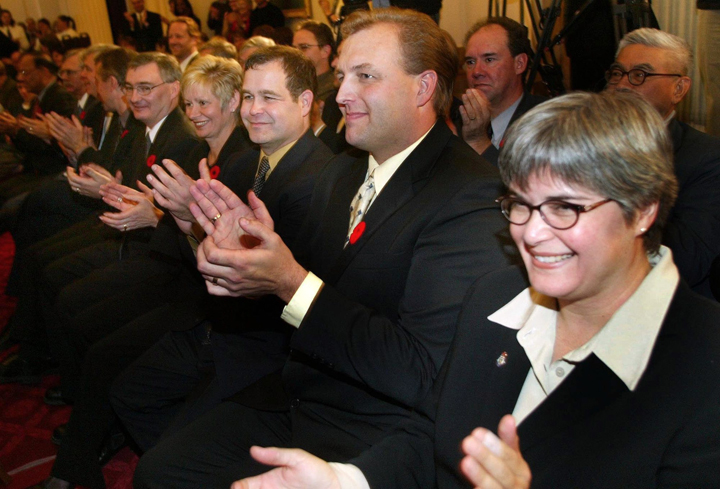WINNIPEG – Lying to or misleading the legislature is an offence under Manitoba law that is punishable by imprisonment, but former cabinet minister Christine Melnick is unlikely to face any substantial punishment, says a political analyst.

“Legislative assemblies … have all the powers to summon witnesses and punish for false testimony and so on, but the reality is those powers are rarely if ever used nowadays,” said Bryan Schwartz, a political science professor at the University of Manitoba who specializes in constitutional law and legislative process.
“We don’t have a system in which independent inquiries can take place without the government calling them and … governments generally don’t like to call inquiries into themselves.”
Melnick came under fire over an legislature debate on April 19, 2012, when she was the NDP government’s immigration minister. Melnick introduced a resolution criticizing the federal government for taking control of some immigration programs run by the province.
The previous day, her assistant deputy minister, Ben Rempel, had sent emails to government-funded immigrant service agencies telling them of the event and saying that people should feel free to come — even if it meant taking the afternoon off work. More than 400 people packed the public gallery and an overflow room.
The Progressive Conservative Opposition immediately accused the government of politicizing the civil service and rounding up people to orchestrate a show of support for the government. The Tories repeatedly asked Melnick and Premier Greg Selinger whether a politician had told Rempel to send the emails.
- Some 2019 candidates ‘appeared willing’ to engage with foreign interference: Hogue inquiry
- Princess Anne to help commission new navy vessel in B.C. ceremony
- Foreign interference ‘undermined’ public confidence in elections: inquiry
- Canada, Manitoba to develop Red Dress Alert for missing Indigenous women and girls
When Melnick appeared before a budget estimates committee on May 30, 2012, she denied being behind the plan and said no one had told Rempel to send the emails.
Last week, a report from the provincial ombudsman said Melnick did indeed tell Rempel to send the invitations. Melnick later issued a short written apology and has refused interview requests.
Selinger told The Canadian Press this week he learned that Melnick had misled the legislature sometime “early on” in the ombudsman’s investigation. He did not go public, but instead waited for the 18-month probe to finish.
Selinger said the mistruth was one of multiple reasons why Melnick was dumped from cabinet along with two other ministers in October of this year. She remains in the NDP caucus.
The Tories want Melnick to be ousted from the New Democrat caucus and have called for a formal inquiry. They point to a section of the Legislative Assembly Act, which forbids “giving false evidence, or prevaricating or otherwise misbehaving … before the assembly or any of its committees.”
Punishment for the offence is a term of the imprisonment, determined by members of the legislature.
But the punishment cannot be meted out unless the legislature first strikes a committee to hold an inquiry and the NDP have a solid majority, holding 37 of the 57 seats.
“Our legislative process, because of its partisanship and its lack of well-established rules and procedures, is not well-equipped to get to the bottom of these kinds of situations,” Schwartz said.
The NDP has already made it clear it considers the matter over now that Melnick has apologized.
The Tories are expected to make their case for an inquiry to the Speaker when the legislature resumes in March.
Members of Parliament in the United Kingdom have discussed the idea of imprisoning people who give false evidence to committees. The House of Commons clerk said earlier this year, however, that there would be problems with that approach, including the need to ensure the accused would have the right to a fair trial-like process.
Schwartz said the Melnick’s situation only came to light because of the ombudsman’s report. The ombudsman does not have the authority to examine the actions of politicians.
The report only mentioned Melnick’s actions to clarify that her assistant deputy minister did not act on his own. It said the way the debate was organized gave rise to the perception of partisanship in the civil service.
“If that (investigation) hadn’t taken place, there never would have been an admission that there had not been a fully truthful representation to the legislature (by Melnick). So who knows what else happened here that we won’t be able to find out about because there won’t be an independent inquiry,” Schwartz said.
Among the unanswered questions that remain — when did Selinger become aware that Melnick ordered her assistant deputy minister to send the email?
Selinger told The Canadian Press this week that he couldn’t specify, but might have known in early May 2012, when he was fielding questions in the legislature. He defended Rempel’s actions and made no mention of Melnick being involved.
“That wasn’t entirely clear. I think we were starting to get some feeling about that,” Selinger said.
Schwartz said one change politicians might want to consider is imposing a requirement on politicians to come forward immediately if they know a colleague has lied.
“There’s got to be a responsibility of people in public office … if there has been inadvertent misrepresentations made on the public record, to correct that as soon as possible,” Schwartz said.
“It seems like this (incident) was left for a year and a half. It also seems that the only reason a correction was ever made was that there was an inquiry made by the ombudsman.”



Comments